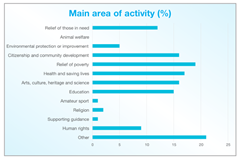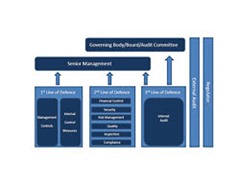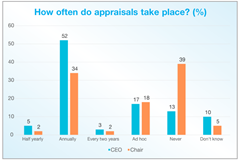Charities: the leadership challenge
 RSM McClure Watters recently conducted a survey of the charity sector. The results, launched at the firm’s Belfast offices on 16 October 2014, highlight some of the key challenges currently facing the sector. In this article, David Gray, RSM Partner with responsibility for the Voluntary and Charitable Sectors sets out the background to the survey and the conclusions and challenges arising.
RSM McClure Watters recently conducted a survey of the charity sector. The results, launched at the firm’s Belfast offices on 16 October 2014, highlight some of the key challenges currently facing the sector. In this article, David Gray, RSM Partner with responsibility for the Voluntary and Charitable Sectors sets out the background to the survey and the conclusions and challenges arising.
It is estimated that Northern Ireland has between 7,000 and 12,000 charitable organisations. These range from the largest international charities right down to local single-purpose organisations that have established themselves under the ‘charity’ banner.
Until recently, none of these organisations in Northern Ireland were subject to regulation, but the Charity Commission for Northern Ireland (CCNI), originally established in 2009 under the Charities Act (Northern Ireland) 2008, is finally catching up with regulatory environment in the rest of the UK (Scotland 2005; England and Wales 2007).
Northern Ireland charities have been required to register with CCNI since December 2013 and from 1 January 2015 the Annual Accountancy and Reporting Regulations come into effect. There is no de-minimus level for registration or reporting – all charitable organisations must register and comply.
Earlier this year we carried out a survey of 500 charitable organisations in Northern Ireland (specifically excluding organisations such as churches and schools which already fell within an overall governing structure). The survey covered a wide spectrum of charitable activity as follows (see charts).
Interestingly, almost one quarter (23 per cent) of respondents said they had not registered with CCNI, but only 9 per cent said that they were not aware of the regulations. The majority (63 per cent) of surveyed organisations operate as Companies Limited by Guarantee and just under 20 per cent have annual income in excess of £1 million.
 Some of the key findings were:
Some of the key findings were:
• 37 per cent of Trustees have a poor understanding of their responsibilities;
• 72 per cent of organisations’ Trustees serve more than two terms;
• 44 per cent of respondents do not appraise their CEO annually;
• 64 per cent of respondents do not appraise their Chairperson annually;
• 30 per cent of organisations feel they are less than moderately effective at assessing their own performance; and
• 35 per cent of respondents rated their knowledge of new regulations as ‘limited’.
So what conclusions can we draw?
Trustees
Around half of respondents (49 per cent) felt there was a limited pool of potential Trustees, with 32 per cent claiming that candidates lacked necessary skills and experience, and 34 per cent saying that suitable candidates were reluctant to accept the obligations of the Trustee role. Sixty-two per cent of Trustees were appointed through personal contacts of the existing Board and only 23 per cent by external advertisement.
 There would seem to be a view that increased regulation and reporting requirements is discouraging potential Trustees due to issues such as fear of criticism for regulatory failures and potential personal financial exposure, for example.
There would seem to be a view that increased regulation and reporting requirements is discouraging potential Trustees due to issues such as fear of criticism for regulatory failures and potential personal financial exposure, for example.
Our alternative interpretation, however, is that there is now an opportunity for charities to attract high calibre Trustees by demonstrating that they have in place good governance structures which protect the organisation and its Trustees. The insurance mark also provides a suite of products specifically designed for the charitable sector.
Annual appraisals
The majority of Charity Chairpersons and just under 45 per cent of CEOs are not subject to annual review. Those that do review stated that the ‘informal discussion’ method of appraisal is applied in 19 per cent of CEO appraisals and 47 per cent of Chairperson appraisals.
 Once again, this represents a governance challenge. We would consider the ‘informal discussion’ is not an acceptable appraisal methodology and a governance review would highlight this.
Once again, this represents a governance challenge. We would consider the ‘informal discussion’ is not an acceptable appraisal methodology and a governance review would highlight this.
In our opinion, all charities should carry out their own self-assessment reviews and governance reviews. Organisations such as RSM McClure Watters are well-placed and experienced to carry out or advise on how these can and should be conducted. Charities should consider where and how well they fit into the above model which demonstrates recognised best practice with regard to managing and providing assurance across an organisation.
Finally, a word of support for CCNI, the regulator. CCNI has a regulatory and advisory role to ensure the practice of good governance; to increase public trust and enhance accountability for donors; beneficiaries; and the general public. The website (www.charitycommisionni.org.uk) is user-friendly and provides a wealth of detail and advice on the implementation of regulators – it should be one of the ‘favourites’ for every charity Trustee and CEO.
RSM McClure Watters
Number One
Lanyon Quay
Belfast, BT1 3LG
Tel: +44 (0) 28 9023 4343
Web: www.rsmmcw.com
Electronic copies of our full survey can be obtained by contacting david.gray@rsmmcw.com





